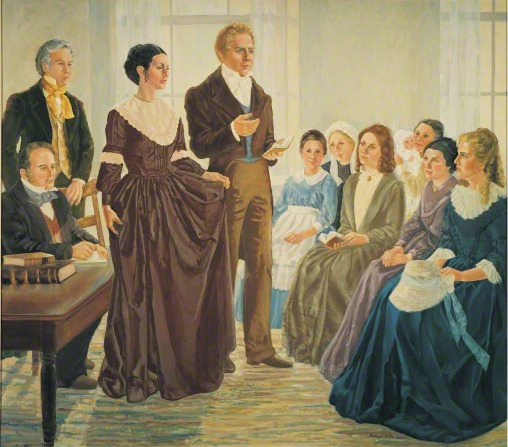As sisters in Zion, we’ll all work together;
The blessings of God on our labors we’ll seek.
How vast is our purpose, how broad is our mission,
If we but fulfill it in spirit and deed.
Oh, naught but the Spirit’s divinest tuition
Can give us the wisdom to truly succeed.
Hymn no. 309. Lyrics by Emily H. Woodmansee.
I was released from my calling in Relief Society. I knew it was coming; I’d been teaching for
about 2 ½ years, and so I’d been bracing myself. Still, when the release came I felt really,
really sad: much sadder than I’d
expected. I love the sisters in my
ward. I love teaching them and learning
from them. I also loved learning through
the Holy Ghost as I prepared and taught my lessons. Teaching in Relief Society has been a
tremendous blessing to me and I will miss it.
 |
| Organization of the Relief Society Source: www.lds.org |
A bit of an aside before I continue: In 1835 a Presbyterian minister from New
England named Charles Finney published his Lectures on Revivals of Religion. Finney’s
departure from conventional Calvinism helped make his Lectures controversial, but the biggest criticism about his
revivals was the role played by women.
Finney not only allowed women to participate behind the scenes, but
women in his congregations could speak and pray in public.
2
In 1842, only a few years later, the Church
of Jesus Christ of Latter-day Saints organized the Relief Society, granting
women members of the Church an official role.
3
Relief Society was revolutionary.
Before I was called to be a teacher in the Relief Society, I
had spent several years teaching children in the Primary Organization. I realized quickly that my lessons to adult
sisters would be very different than my lessons to the children. The sisters in my ward were smart. They knew a lot about the gospel. They didn’t need someone to teach, so much
as lead a discussion. We all taught
each other, no matter who stood at the podium.
 |
| The Female Relief Society of Nauvoo was founded here, in Nauvoo's "red brick store" Photo by John Hamer Source: wikimedia commons |
During the first meeting of the Female Relief Society of
Nauvoo, (17 March 1842) Joseph Smith read
D&C section 25. He clarified verse
7: “And thou shalt be ordained under his
hand to expound scriptures, and to exhort the church, according as it shall be
given thee by my Spirit,” explaining,”[Emma] was ordain’d at the time, the
Revelation was given, to expound the scriptures to all; and to teach the female
part of community; and that not she alone, but others, may attain to the same
blessings.”
In a later meeting (28 April 1842), President Joseph Smith
discussed chapter 12 of 1 Corinthians.
Each sister in Relief Society has different spiritual gifts, he
explained, and God needs all the sisters.
5
I remember learning the same thing
as I taught Relief Society in the Tithing Hill ward. I am a left-brain thinker. When I teach, my lessons are very organized
and logical. Sometimes I struggle to
connect emotionally with the sisters in the room. The other sister who taught from the Teachings of the Presidents of the Church manual,
however, was really good at this. Sometimes
I would watch Sister Musselman teach, look at the emotional responses of the others
in the room, and wonder, wow, how does
she do this? After a few months of watching her I realized
that God had called both of us to teach for this very reason: He had given each of us talents in teaching,
and He needed both of us, with our different strengths. I could talk about what I thought, and she
could talk about what she felt, and together we could reach everyone in the
room.
God depends on all His daughters to use their different
abilities to build the kingdom. In Nauvoo
the sisters donated time, money, and work.
The sisters who cooked gave food.
The sisters who spun gave flax and wool.
The sisters who sewed donated clothing or embroidery. Some sisters gave soap, or collected
donations, or tended the sick. Though they
gave differently, they all gave something. They gave to the poor and
needy and, during the spring of 1843, they also donated to the temple. Despite their differences, they all wanted to
serve God, assist the poor, and receive their temple covenants. In my ward, also, I found that we Relief
Society sisters are alike in the most important ways. As we discussed motherhood, I learned that
every mother, married or single, working at home or in a career, worries about
her children. I learned that every woman
in Relief Society loves the Lord, wants to serve Him, and feels inadequate.
I’ve learned a lot from Relief Society over the past 2 ½
years. Much of what I’ve
learned—probably the most important things I learned—did not come from the
formal lessons. I don’t have a new
calling yet, but I can still say, joyfully and thankfully, I am a member of
Relief Society!
"1. Relief Society Minute Book, Nauvoo, Illinois, Mar. 24,
1842,18-19; also quoted in Daughters in
my Kingdom,25"
rback
"2. Howe, Daniel Walker, What hath God wrought: The transformation of America, 1815-1848,(Oxford,2007), 172" back
"3. See daughters in my kingdom p.15." back
"4. Nauvoo Relief Society Minute Book, 8." back
"5. Relief Society Minute Book, Nauvoo, Illinois, Apr. 28, 1842,35" back
"2. Howe, Daniel Walker, What hath God wrought: The transformation of America, 1815-1848,(Oxford,2007), 172" back
"3. See daughters in my kingdom p.15." back
"4. Nauvoo Relief Society Minute Book, 8." back
"5. Relief Society Minute Book, Nauvoo, Illinois, Apr. 28, 1842,35" back
No comments:
Post a Comment